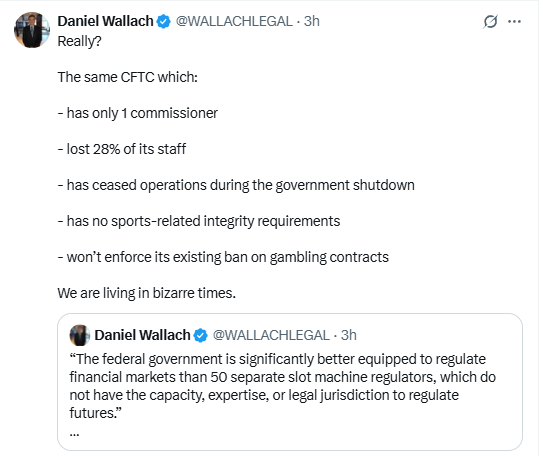Reserved For VIPs
Massachusetts regulators are taking a close look at the VIP practices of licensed sportsbooks.
The Bulletin Board
THE LEDE: Will Massachusetts crack down on VIP programs with new rules?
ROUNDUP: Live dealer games increasingly popular in PA; PrizePicks debuts new social features; TX casino supporters are spending big on candidates.
NEWS: Cardrooms score major victory against California tribes.
VIEWS: More on Kalshi’s international expansion.
AROUND the WATERCOOLER: Rolling Stone article provides fodder.
STRAY THOUGHTS: Basics, basics, basics.
Sponsor’s Message: Increase Operator Margins with EDGE Boost Today!
EDGE Boost is the first dedicated bank account for bettors.
Increase Cash Access: On/Offline with $250k/day debit limits
No Integration or Costs: Compatible today with all operators via VISA debit rails
Incremental Non-Gaming Revenue: Up to 1% operator rebate on transactions
Lower Costs: Increase debit throughput to reduce costs against ACH/Wallets
Eliminate Chargebacks and Disputes
Eliminate Debit Declines
Built-in Responsible Gaming tools
To learn more, contact Matthew Cullen, Chief Strategy Officer, Matthew@edgemarkets.io
The Lede: MA Regulators Consider New VIP Rules
During a meeting last week, the Massachusetts Gaming Commission discussed potential regulatory changes that would affect VIP programs at the state’s licensed sportsbooks. The MGC’s interest in VIP programs is happening hand-in-hand with conversations on limiting.
“VIP programs should be for those who can afford to be VIPs, and it shouldn’t be predatory. This jurisdiction cares about things like that,” MGC Chair Jordan Maynard said. “This goes hand-in-hand with the conversation we just had on limiting.”
During the meeting, the MGC was shown a slide deck presentation titled “Sports Wagering VIP Programs,” prepared by Carrie Torrisi, Chief of Sports Wagering, and Mark Vander Linden, Director of Research and Responsible Gaming.
The report included possible data and information requests related to VIP programs, including:
Percentage of revenue from VIPs (and breakdown by tier if tiered).
Total handle (wagers) for individual VIPs.
Logs of communications between VIPs and hosts.
Detailed breakdown of VIPs using RG tools.
Demographic data comparing VIPs to the overall player base.
It also offered potential regulatory frameworks that the MGC can explore:
Clearly define VIP customers and programs
Set minimum age for VIP status at 25
Ensure staff are trained to manage VIPs effectively
Limit number or amount of bonuses provided to VIPs in particular timeframe
Require regular reporting of complaints related to VIP program/from VIPs
Require annual submission of VIP-related policies
Conduct checks before making any customer a VIP, including affordability, safer gambling, and enhanced due diligence
Make limit setting and receiving activity reports the default options, and allow loyalty program members to opt-out rather than opt-in
Promote the Lower Risk Gambling Guidelines to loyalty program members and VIPs
Eliminate time-sensitive or risk-promoting incentives
Promptly comply with requests to be removed from reward programs and stop any personalized incentives immediately
Previous STTP reporting on limiting:
Don’t Bite The Hand That Feeds You — MA sportsbooks no-showing the MGC
Roundup: Live Dealer Games in PA; PrizePicks New Social Features; TX Casino Update
Live Dealer games increase in popularity in PA [Play Pennsylvania]: Live dealer games are increasingly popular online: “The Pennsylvania Gaming Control Board revealed in its annual report the importance of live dealer games. The vertical makes up more than 60% of online table games revenue… Two years ago, the sector accounted for just over 50% of online table games revenue.”
PrizePicks debuts new social app features [Press Release]: PrizePicks unveiled “The Feed,” a new app feature that allows players to see and interact with picks their peers are making in real time, bringing debates out of the group chat and into the PrizePicks app. Per the press release, PrizePicks players can now: Search and follow friends with player profiles, copy and react to lineups, and share lineups and profiles.
Texas casino supporters back candidate in special election [WOAI News Radio]: “The Texas Sands PAC, the political arm of Las Vegas Sands, has made a $500,000 contribution to former Southlake Mayor John Huffman.” Brandon Waltens, senior editor at Texas Scorecard, said in a report: “The casino lobby has actually lost ground in the legislature over the last couple of years, so now they are committed to playing the long game, one seat and race at a time.”
Sponsor’s Message: Promoting a sustainable, entertainment-first global gaming industry.
Play’n GO is celebrating its 20th anniversary in 2025. Drawing on that experience from the dawn of the iGaming industry through to today, Play’n GO designs and creates world-class slot games in the online casino space.
Play’n GO wants to see a sustainable industry that puts players first. To realize that vision, Play’n GO:
Creates games designed to be entertaining and fun first
Actively lobbies for increased regulation to keep players safe
Refuses to make games that feature mechanics that we believe to be predatory, such as those that allow players to pay hundreds of times their normal stake to buy into the bonus round directly (‘Bonus Buy’ games)
Now live in over 35 regulated territories around the world, including all US and Canadian iGaming jurisdictions, Play’n GO is the leading provider of entertainment to the online casino industry.
News: CA Tribes Suffer Setback in Fight Against Cardrooms
Sacramento County Superior Court Judge Lauri A. Damrell dismissed a lawsuit brought by California tribes against the state’s commercial cardrooms. Judge Damrell ruled that the lawsuit is preempted by federal law.
“I may be wrong, and I expect there will be an appeal, so I welcome the guidance from the Court of Appeal on this as well,” Judge Damrell said.
On cue, tribal attorney Adam Lauridsen said the tribes will file an appeal.
The ruling was foreshadowed during oral arguments last month, when Judge Damrell said, “Previously, the power of IGRA to preempt state law has only been used in narrow situations and in relation to gambling on-reservation. In this case, the gambling in question is taking place off-reservation.”
California Gaming Association President Kyle Kirkland issued the following statement in praise of the ruling:
“Cardrooms for many decades have proudly operated lawful games with full transparency and stringent oversight by the office of the Attorney General of the State of California and the California Gambling Control Commission. We are encouraged by today’s decision. Our member cardrooms will continue to support good jobs, vital public services, and local economies across California while upholding the highest standards of integrity, accountability, and compliance.”
Tribes were granted the opportunity to sue after the California legislature passed Senate Bill 549, which gave tribes a one-time opportunity to sue cardrooms directly in state court — previous efforts were dismissed for lack of standing.
“The dispute traces back to 1988, and the passage of the Indian Gaming Regulatory Act (IGRA), which grants tribes exclusive rights to certain casino-style games on their lands through compacts with the state.
“In California, tribes argue that cardrooms have skirted these restrictions by using third-party proposition players (TPPPS) to act as the “house” in banked games, a practice they deem illegal under state law.”
Views: China and India are Part of Kalshi’s Growth Plan
In yesterday’s newsletter, I noted that Sportico’s Dan Bernstein reported he was able to access Kalshi from France, one of the countries that is supposedly a no-go jurisdiction for the company according to its membership agreement.
Kalshi later sent Bernstein a statement that reads in part, “References to ‘restricted jurisdictions’ in Kalshi’s Membership Agreement relate to citizenship and registered address, not to the physical location from which an already verified member may access their account while traveling or temporarily located elsewhere.”
STTP’s reading of that statement is that so long as you registered in an authorized (by Kalshi) country, you can access the app from anywhere you like — I’m sure countries like China and India (where more than a third of the global population lives) will have something to say about that.
And speaking of China and India, Bernstein followed up on this yesterday:
“While the prediction market hub did not immediately confirm which countries would gain access, instead providing a non-exhaustive list of prohibited places in an updated membership agreement, the company wrote in an email to Sportico Monday that China and India are part of the worldwide growth plan.”
China has notoriously tight restrictions on internet activity, with social media bans and prohibitions on gambling, sans state-run entities.
As STTP recently reported, India “passed a blanket ban on online real-money gambling, dubbed the Promotion and Regulation of Online Gaming Act 2025.” The ban extends to “virtually every form of online gambling, regardless of whether games are based on skill or chance. The bill also prohibits advertisements and financial transactions related to the gambling platforms.” That includes prediction markets, as Bernstein noted on X:
And remember that big brouhaha about betting on planes, well:
SPONSOR’S MESSAGE: We’ve entered a new era of identity—it’s easier than ever before for cybercriminals to access stolen or synthetic IDs. On the other hand, your legitimate players are looking for a fast, frictionless onboarding experience.
So—how do you stop the rotten apples from spoiling things for your good player base?
IDComply triggers 800+ risk checks at the beginning of the player journey, gathering rich device, location, and user intelligence that’s processed through our ML models to detect even the most sophisticated fraud tactics. This gives you a clearer picture of not only who wants to enter your platform, but what they intend to do once they get in.
From there, you can tailor your experience: streamline the most trustworthy players and add step-up verification for those who trigger suspicion. As well as detecting 40% of fraudulent players from the get-go, this can increase onboarding for your good base by up to 20%.
Get in touch for a deep dive on what this looks like for your platform.
Around the Watercooler
Social media conversations, rumors, and gossip.
A recent article on prediction markets in the Nevada Independent is drawing attention due to a statement from Kalshi’s Head of Corporate Development, Sara Slane.
This is the part that is making the rounds on social media:
“The federal government is significantly better equipped to regulate financial markets than 50 separate slot machine regulators, which do not have the capacity, expertise, or legal jurisdiction to regulate futures,” Slane wrote in a statement to the Nevada Independent.
I’ve also questioned the CFTC’s capability to oversee sports betting:
“There is obviously redundancy at the state level, but notice that the low-end estimate exceeds the entire CFTC workforce, which is already overburdened in its oversight of the multitrillion-dollar swaps market (the US swaps market’s notional value is likely $250–350 trillion, compared to sports betting’s $200–300 billion in handle).
“No matter how on board the CFTC is with sports contracts, one has to wonder if it’s equipped or has the appetite to handle it. Is hiring hundreds of experts to oversee sports contracts, which at the top-end might account for $100 billion of the $300 trillion in trades you oversee, worth it?”
Further, as I noted in a previous column, Slane’s current positions don’t align with previous remarks during her time with the American Gaming Association (AGA):
September 2018: Slane testified that state and tribal regulation was the way to go:
“The result of bringing betting activity into a legal market, under state and tribal regulatory oversight, will be increased transparency, game integrity and consumer protections, while supporting jobs and generating tax revenues…
“States and tribes have proven to be effective gaming regulators in the 26 years since Congress enacted PASPA. As Congress has refrained from regulating lotteries, slot machines, table games and other gambling products, it should similarly refrain from engaging on sports wagering barring an identifiable problem that warrants federal attention.”
Following the Supreme Court’s PASPA decision, Slane told NBC Bay Area on May 23, 2018:
“Sara Slane, a senior vice president at the American Gaming Association, said she believes Congress is going to have a hard time catching up with states that are moving quickly to legalize and regulate sports betting.
“She said that many federal lawmakers already view sports betting as a states’ rights issue and that it will be difficult for Congress to roll back those efforts once betting operations are up and running.
“‘I do see this as somewhat dead in the water,” she said of federal legislation. “This is going to largely unfold on the state level.’”
But to me, this is the more eye-popping statement from Slane, as it implies that people should approach sports betting like it’s a financial service:
“U.S. markets need to encourage innovation and choice in financial services,” she added.
This is actually the rub, as Bill Miller noted at G2E:
“They decide where and when they’ll operate, telling states, tribes, and citizens they have no voice in the process,” AGA President and CEO Bill Miller said of the prediction market’s emergence. “They pay a pittance in taxes and certainly do not generate the $330 billion in economic impact or any of the community benefits we provide. When it comes to helping customers play responsibly, they couldn’t care less.”
Reclassifying betting (gambling) as something akin to financial services like investing is not going to play well… anywhere.
A few outlets have also poked holes in the Rolling Stone column for several unforced errors:
The Early Line: If You Criticize Sports Betting, At Least Get The Facts Right
Rolling Stone’s Sports Betting ‘Expose’ Is Riddled With Lies — Here’s Proof
Stray Thoughts
I recently came across this and jotted it down on a sticky note: A black belt is tested on the techniques they learned as a white belt.
Similarly, the best boxers have perfected the punches and footwork they learned on the first day they entered the gym.
Do the basics (the foundational things) correctly, and you’ll be successful.










